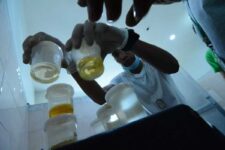
Local dialects enhance anti-drug efforts
THE City Anti-Drug Abuse Council (Cadac) is now using the local dialects of Indigenous Communities (ICs) for its culturally sensitive Information, Education, and Communication (IEC) materials.
During the ISpeak media forum on Thursday, September 13, 2024, at the City Health Office (CHO), Cadac action officer Jaffar Marohomsalic said 10 of the city’s 11 native languages have already been translated and distributed to barangays.
“These information, education, communication materials, and strategic framework aim to promote awareness, knowledge, and behavior change, desired change, provide distinct recovery programs and the integration of drug reformists,” Marohomsalic said.
He noted that the technical nature of the original English materials made them difficult for some communities to fully grasp, so they were translated into local dialects to enhance understanding. The translated materials cover the details and procedures of Republic Act No. 9165, the Comprehensive Dangerous Drugs Act.
Marohomsalic emphasized that making these materials accessible to Indigenous people will increase awareness of the dangers of drug use and help prevent drug involvement in these communities.
So far, the languages translated include Bagobo-Klata, Bagobo-Tagabawa, Obu Manuvu, Ata, Matigsalug, Tausug, Maguindanaon, Sama, Kagan, and Iranun.
Cadac has begun distributing the materials to barangays with significant Indigenous Community populations.
This initiative, in partnership with the Department of Education (DepEd), aims to expand tribes’ knowledge about illegal drugs, especially government programs and recovery efforts. The translation process took around one to two years to complete.
Marohomsalic earlier said that Cadac is committed to a proactive approach, focusing on prevention rather than dealing with drug issues only after they arise. He pointed out that tackling drug problems post-occurrence is significantly more challenging.
In an interview with Davao City Disaster Radio (DCDR), Marohomsalic explained that another key goal is to enhance the effectiveness of each Barangay Anti-Drug Abuse Council (Badac).
Currently, 39 Badacs are highly functional and accredited by the Department of the Interior and Local Government (DILG), with 17 more candidates in the pipeline.
The reorientation of focal persons on August 30 was part of their strategy to improve Badac’s performance. RGP WITH CIO REPORT



